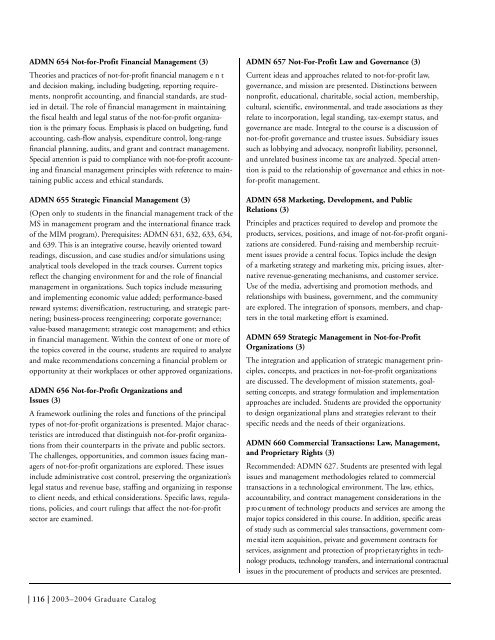A+B. Intro_SJ.1 - University of Maryland University College
A+B. Intro_SJ.1 - University of Maryland University College
A+B. Intro_SJ.1 - University of Maryland University College
You also want an ePaper? Increase the reach of your titles
YUMPU automatically turns print PDFs into web optimized ePapers that Google loves.
ADMN 654 Not-for-Pr<strong>of</strong>it Financial Management (3)<br />
Theories and practices <strong>of</strong> not-for-pr<strong>of</strong>it financial managem e n t<br />
and decision making, including budgeting, re p o rting requirements,<br />
nonpr<strong>of</strong>it accounting, and financial standards, are studied<br />
in detail. The role <strong>of</strong> financial management in maintaining<br />
the fiscal health and legal status <strong>of</strong> the not-for-pr<strong>of</strong>it organization<br />
is the primary focus. Emphasis is placed on budgeting, fund<br />
accounting, cash-flow analysis, expenditure control, long-range<br />
financial planning, audits, and grant and contract management.<br />
Special attention is paid to compliance with not-for-pr<strong>of</strong>it accounting<br />
and financial management principles with reference to maintaining<br />
public access and ethical standards.<br />
ADMN 655 Strategic Financial Management (3)<br />
(Open only to students in the financial management track <strong>of</strong> the<br />
MS in management program and the international finance track<br />
<strong>of</strong> the MIM program). Pre requisites: ADMN 631, 632, 633, 634,<br />
and 639. This is an integrative course, heavily oriented toward<br />
readings, discussion, and case studies and/or simulations using<br />
analytical tools developed in the track courses. Current topics<br />
reflect the changing environment for and the role <strong>of</strong> financial<br />
management in organizations. Such topics include measuring<br />
and implementing economic value added; performance-based<br />
reward systems; diversification, restructuring, and strategic partnering;<br />
business-process reengineering; corporate governance;<br />
value-based management; strategic cost management; and ethics<br />
in financial management. Within the context <strong>of</strong> one or more <strong>of</strong><br />
the topics covered in the course, students are required to analyze<br />
and make recommendations concerning a financial problem or<br />
opportunity at their workplaces or other approved organizations.<br />
ADMN 656 Not-for-Pr<strong>of</strong>it Organizations and<br />
Issues (3)<br />
A framework outlining the roles and functions <strong>of</strong> the principal<br />
types <strong>of</strong> not-for-pr<strong>of</strong>it organizations is presented. Major characteristics<br />
are introduced that distinguish not-for-pr<strong>of</strong>it organizations<br />
from their counterparts in the private and public sectors.<br />
The challenges, opportunities, and common issues facing managers<br />
<strong>of</strong> not-for-pr<strong>of</strong>it organizations are explored. These issues<br />
include administrative cost control, preserving the organization’s<br />
legal status and revenue base, staffing and organizing in response<br />
to client needs, and ethical considerations. Specific laws, regulations,<br />
policies, and court rulings that affect the not-for-pr<strong>of</strong>it<br />
sector are examined.<br />
ADMN 657 Not-For-Pr<strong>of</strong>it Law and Governance (3)<br />
Current ideas and approaches related to not-for-pr<strong>of</strong>it law,<br />
governance, and mission are presented. Distinctions between<br />
nonpr<strong>of</strong>it, educational, charitable, social action, membership,<br />
cultural, scientific, environmental, and trade associations as they<br />
relate to incorporation, legal standing, tax-exempt status, and<br />
governance are made. Integral to the course is a discussion <strong>of</strong><br />
not-for-pr<strong>of</strong>it governance and trustee issues. Subsidiary issues<br />
such as lobbying and advocacy, nonpr<strong>of</strong>it liability, personnel,<br />
and unrelated business income tax are analyzed. Special attention<br />
is paid to the relationship <strong>of</strong> governance and ethics in notfor-pr<strong>of</strong>it<br />
management.<br />
ADMN 658 Marketing, Development, and Public<br />
Relations (3)<br />
Principles and practices required to develop and promote the<br />
products, services, positions, and image <strong>of</strong> not-for-pr<strong>of</strong>it organizations<br />
are considered. Fund-raising and membership recruitment<br />
issues provide a central focus. Topics include the design<br />
<strong>of</strong> a marketing strategy and marketing mix, pricing issues, alternative<br />
revenue-generating mechanisms, and customer service.<br />
Use <strong>of</strong> the media, advertising and promotion methods, and<br />
relationships with business, government, and the community<br />
are explored. The integration <strong>of</strong> sponsors, members, and chapters<br />
in the total marketing effort is examined.<br />
ADMN 659 Strategic Management in Not-for-Pr<strong>of</strong>it<br />
Organizations (3)<br />
The integration and application <strong>of</strong> strategic management principles,<br />
concepts, and practices in not-for-pr<strong>of</strong>it organizations<br />
are discussed. The development <strong>of</strong> mission statements, goalsetting<br />
concepts, and strategy formulation and implementation<br />
a p p roaches are included. Students are provided the opportunity<br />
to design organizational plans and strategies relevant to their<br />
specific needs and the needs <strong>of</strong> their organizations.<br />
ADMN 660 Commercial Transactions: Law, Management,<br />
and Proprietary Rights (3)<br />
Recommended: ADMN 627. Students are presented with legal<br />
issues and management methodologies related to commerc i a l<br />
transactions in a technological environment. The law, ethics,<br />
a c c o u n t a b i l i t y, and contract management considerations in the<br />
p ro c u rement <strong>of</strong> technology products and services are among the<br />
major topics considered in this course. In addition, specific areas<br />
<strong>of</strong> study such as commercial sales transactions, government comm<br />
e rcial item acquisition, private and government contracts for<br />
s e rvices, assignment and protection <strong>of</strong> pro p r i e t a ry rights in technology<br />
products, technology transfers, and international contractual<br />
issues in the pro c u rement <strong>of</strong> products and services are presented.<br />
| 116 | 2003–2004 Graduate Catalog

















